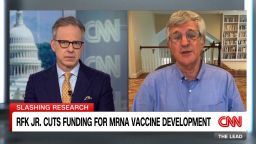US Cuts mRNA Vaccine Funding, Raising Pandemic Preparedness Risks

The recent decision by the U.S. government to cut funding for mRNA vaccine development has raised significant concerns among public health experts. On March 15, 2024, U.S. Health and Human Services Secretary Robert F. Kennedy Jr. announced the cancellation of a planned $500 million investment in mRNA technology under the Biomedical Advanced Research and Development Authority (BARDA). This move comes shortly after President Donald Trump praised Operation Warp Speed, the initiative that accelerated the development of COVID-19 vaccines.
Experts warn that this funding cut could leave the United States vulnerable to future pandemics and biological threats. The decision to halt mRNA research could severely impact the country’s ability to respond effectively to health crises, making it nearly impossible to replicate the rapid success of Operation Warp Speed in case of another outbreak.
Dr. Cynthia Leifer, a professor of immunology at Cornell University, criticized the move, likening it to partially financing a kitchen remodel and stopping once the walls are down. She emphasized the importance of mRNA technology, stating, “You’d be out your money and you don’t have a kitchen.” This sentiment underscores the belief among many health professionals that abandoning mRNA research could have dire consequences.
The mRNA platform has proven effective in responding to pandemics due to its flexibility. Dr. Jennifer Nuzzo, an epidemiologist and director of the Pandemic Center at the Brown University School of Public Health, highlighted the speed at which mRNA vaccines can be developed. Unlike traditional vaccine methods, which often involve lengthy processes, mRNA vaccines can be designed in days, allowing for quick responses to emerging health threats.
Dr. Michael Osterholm, a prominent epidemiologist at the University of Minnesota, described the decision to wind down government investment in mRNA vaccines as one of the worst public health choices in decades. He pointed out that vaccines comprise a small portion of the pharmaceutical industry, and government funding is essential for driving their development. The cancellation might undermine broader support for mRNA vaccines, which could have lasting implications for public health.
In response to the funding cuts, Kennedy asserted that the government is shifting its focus to “safer, broader vaccine platforms” that can adapt to mutating viruses, such as whole virus vaccines. Although some countries have developed whole virus COVID-19 vaccines, studies have shown they did not achieve the same effectiveness as mRNA vaccines.
The implications of this funding cut extend beyond public health. Nuzzo remarked that the reduction in investment could signal weakness in U.S. defenses against biological attacks. “It sends a bad signal to our adversaries about our commitments to protecting ourselves,” she stated. Such a retreat from mRNA vaccine investment may embolden potential aggressors, as it undermines the nation’s preparedness posture.
Moreover, Dr. Katalin Karikó, a key figure in developing mRNA vaccine technology and a 2023 Nobel Prize recipient, expressed concern over the long-term effects of the funding cuts. She noted that the current generation of scientists might not have the same opportunities she encountered when she moved to the U.S. from Hungary. “It is really the next generation that will suffer the most,” Karikó warned. “When we have the next pandemic, other countries will have to help us out.”
As the U.S. navigates this critical juncture in public health strategy, the decision to cut funding for mRNA vaccines raises pressing questions about the country’s future ability to respond to health emergencies. The shift in focus may have significant repercussions that extend far beyond the immediate effects of the funding cuts, potentially stifling innovation and leaving the nation less prepared for the next pandemic.






